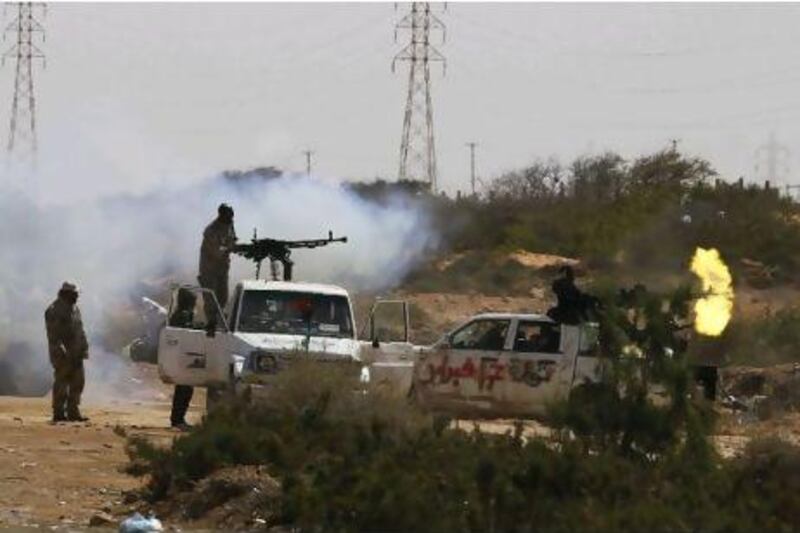Pressure for a political settlement of the conflict in Libya intensified yesterday as Britain and France called on Col Muammar Qaddafi's own supporters to "drop him before it is too late".
David Cameron, the British prime minister, and Nicolas Sarkozy, the French president, issued a joint appeal to Col Qaddafi's partisans on the eve of today's London meeting of European, American, Arab and African representatives.
In a joint statement urging regime loyalists to side with the rebels, they said: "Qaddafi must go immediately. We call on all his supporters to drop him before it is too late."
They appealed for the start of "a national political dialogue, leading to a representative process of transition, constitutional reform and preparation for free and fair elections".
The two leaders added: "Military action is not an objective as such. A lasting solution can only be a political one that belongs to the Libyan people. That is why the political process that will begin in London is so important."
Their intervention coincided with signs of further advances by rebels fighting to end the Libyan dictator's 41-year rule. Though disjointed and relatively ill-equipped, opposition forces were said to be on the verge of mounting a battle for control of Colonel Qaddafi's birthplace, the port of Sirte.
In seizing a string of key towns including Ajdabiya, Brega and Ras Lanuf, insurgents have taken advantage of coalition air strikes, now being transferred to Nato command, to continue their unsteady march on the capital Tripoli.
The capture of Sirte, more than 400km to the east, would be a breakthrough of huge symbolic value, shaking remaining loyalty to Colonel Qaddafi. One rebel spokesman was reported yesterday as saying the city had already fallen, but this claim appeared premature.
Today's London conference follows a flurry of diplomatic activity aimed, in part, at persuading Colonel Qaddafi to end the conflict by accepting exile.
The Italian foreign minister, Franco Frattini, said yesterday: "Qaddafi must understand that it would be an act of courage to say 'I understand that I have to go'." Mr Frattini has discussed with several European counterparts outline proposals for Colonel Qaddafi's departure, a UN-monitored ceasefire and the a "humanitarian corridor".
The Italians regard the Arab League and African Union, both taking part in the summit, as vital to the success of such a deal. Mr Frattini had talks yesterday with Turkish officials whose support is also considered essential.
But until a political solution appears, the military action continues. Qaddafi forces, stubbornly refusing to give up easily, were said to be in control of part of Misurata, which lies between Sirte and Tripoli. The Libyan foreign ministry later said that the government would observe a ceasefire in its struggle against what it called "terrorist elements" in the city, where food, water and medical provisions have been in short supply.
Amid the confusion, Libyan officials accused coalition forces of killing civilians in strikes on the southern desert city of Sabha. Britain's defence ministry confirmed that Royal Air Force Tornado aircraft had carried out attacks but said the targets were ammunition bunkers.
Correspondents in the Sirte area said yesterday that rebel forces gathered almost 100km to the east seemed to be awaiting further coalition strikes before proceeding.
That advance is unlikely to be delayed for long and may already have been preceded by rocket attacks. The Agence France-Presse news agency reported at least nine explosions in Sirte yesterday morning.
Last night, the US president, Barack Obama, was hoping to rally American support for his approach to the crisis in a televised keynote speech at the National Defense University in Washington, DC. The administration's undisguised efforts to limit involvement in a third conflict in Muslim territory have so far failed to silence critics. Public support for Mr Obama's actions is lukewarm, though opinion polls suggest that more people back US air strikes than oppose them.
Whatever arguments have been raised about the scope and effects of military action undertaken since UN resolution 1973 was passed, it is clear Col Qaddafi forces have been severely weakened by 10 days of strikes from air and sea.
Analysts have argued throughout that the terms of the resolution allow the coalition wide flexibility in their interpretation.
But Nato's secretary general, Anders Fogh Rasmussen, insists that the intention was to implement the Security Council resolution, "nothing more and nothing less".
At the Allied joint force command in Naples, southern Italy, Lt General Charles Bouchard said Nato aircraft had flown in their first no-fly zone enforcement mission on Sunday.
General Bouchard, tye Canadian head of the operation, code-named Unified Protector, said the transition from coalition command was not complete but added: "Nato will soon be implementing all military aspects of the UN resolution."
After the decisions of the UAE and Qatar to commit fighter jets, General Bouchard said Nato would welcome further international partners. "The broader the effort, the more powerful the message we send to the Libyan people who are desperate for our help," he said.
The 12 UAE fighter jets due to help patrol the Libyan no-fly zone flew to the Italian island of Sardinia on Sunday.
The decision to involve UAE aircraft in the coalition was announced last Friday by the Minister for Foreign Affairs, Sheikh Abdullah bin Zayed.






